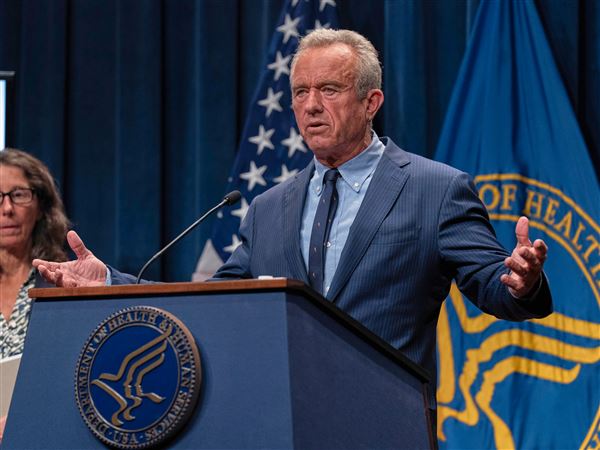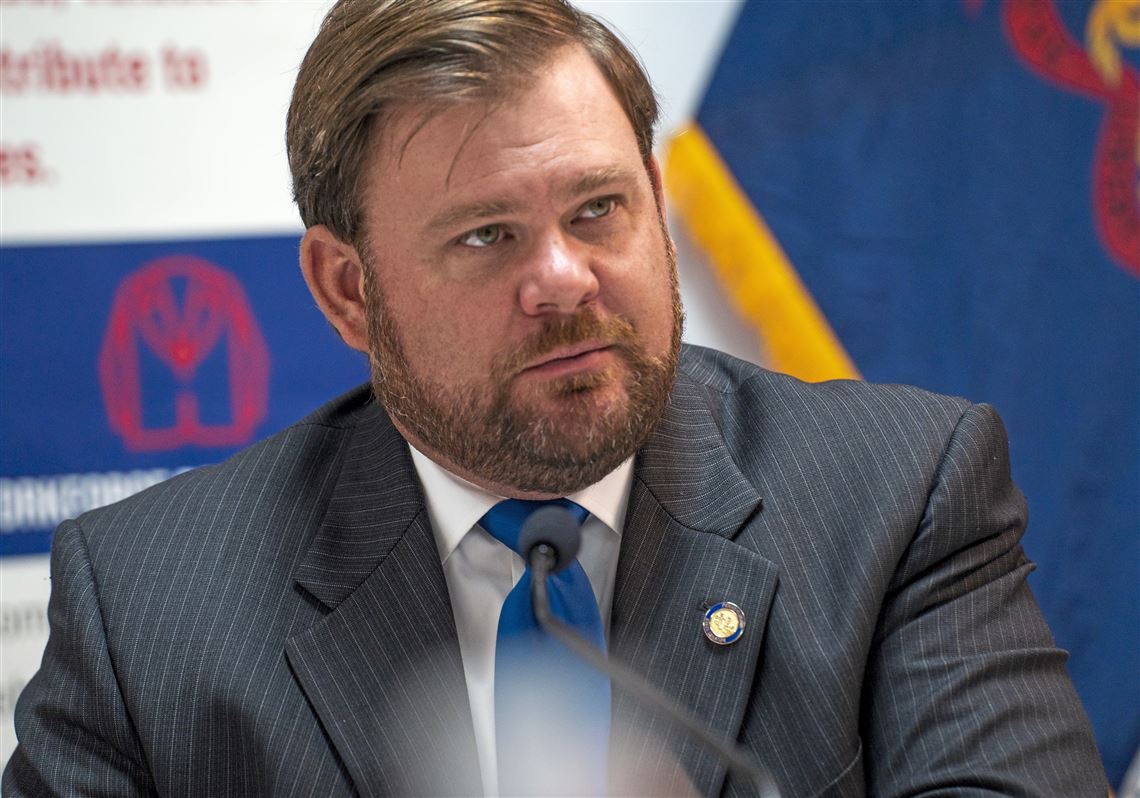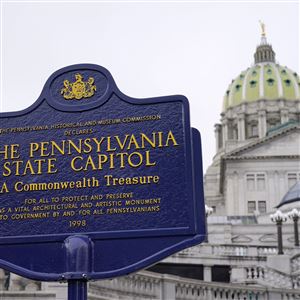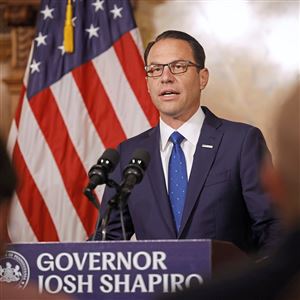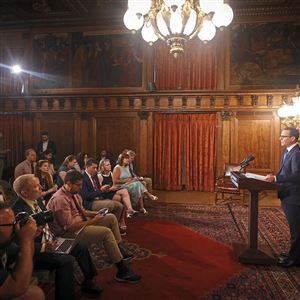HARRISBURG — In a starkly worded letter that gave no hint of an end to the state’s 11-day-old budget impasse, the Senate’s Republican leader on Tuesday said he saw no reason to call the chamber back to session just to send a disputed spending bill to Gov. Josh Shapiro.
In the letter, Sen. Joe Pittman, R-Indiana, told Rep. Matt Bradford, D-Montgomery and the House majority leader, that there are many items in the $46.55 billion spending bill that require additional legislation to be fully enacted. Those items, Mr. Pittman said, include indigent defense, the Whole-Home Repairs program, Level-Up money for needy schools, and even a big chunk of basic education funding.
“Please let me know if you plan to vote on any of the remaining budget implementation legislation,” Mr. Pittman wrote.
“Furthermore,” he added, “please give me a clear understanding whether you plan to coordinate with the governor and speak as a unified voice in future discussions, as was previously thought to be the case throughout budget negotiations prior to June 30th.”
In a statement later on Tuesday, Mr. Bradford said Senate Republicans should return to Harrisburg so the spending bill can be signed and sent to Mr. Shapiro. Without that, Mr. Bradford said, Republicans are “continuing to stand in the way of funding for schools, county human services including drug and alcohol treatment and kids in foster care, and other critical programs and services that support Pennsylvanians.”
Mr. Bradford said there was “no need or rationale” to not send the bill to the governor.
But Mr. Pittman’s letter gave no indication that multiple fractures in budget negotiations that occurred last week were healing. As a letter released to the news media, it reflected little progress between the parties after Mr. Shapiro declared last Thursday that “it is now the responsibility of the House and Senate to find a way to work together.”
Beyond that, Mr. Pittman indicated no change in the Senate’s staunch support for including a voucher-style program in the budget that would give taxpayer-funded scholarships to students in low-performing public schools so they could attend private ones. Mr. Shapiro, who has long supported such a concept, last week said he would veto the $100 million for it in the spending bill — in part because there was no enabling legislation for the program.
Mr. Pittman said that like the scholarships line item, there are many other lines in the spending bill “where the General Assembly has not statutorily provided for adequate standards or guidance to spend the money that has been appropriated.”
Late Monday, a spokesperson for Mr. Shapiro — a Democrat who has proven willing to work with Republicans but has seen his Harrisburg honeymoon end with the budget fight — struck a positive tone in a statement.
“Throughout this process, Gov. Shapiro has been engaged in productive conversations with Leader Pittman and Leader Bradford — and while there is still more work to do, he remains committed to working with both parties and both chambers in order to finalize a budget that addresses the most pressing issues facing our Commonwealth,” said the spokesperson, Manuel Bonder. “As he always has, the governor will continue working to bring Republicans and Democrats together in order to deliver real results for all Pennsylvanians.”
A protracted budget dispute could give a higher profile to state Treasurer Stacy Garrity, whose office oversees funds with tens of billions of dollars used for many purposes, including long-term savings and paying bills. The state’s so-called Rainy Day Fund currently holds about $5.1 billion, and the General Fund about $15.9 billion.
Without a budget in place, questions could arise about granting some requests for payment. A spokesperson for Ms. Garrity, Erik Arneson, said an unusual scenario might develop if a spending bill is signed into law without the other “code” bills that traditionally accompany it and describe the implementation of that spending.
“That could lead to some payment requests being returned due to a lack of sufficient spending authority,” Mr. Arneson said. “Any such decisions will be made on a case-by-case basis after a thorough review by Treasury’s fiscal review team. If a payment request is returned to an agency, the agency could wait until the relevant code bill is enacted and resubmit that request.”
The House on June 5 passed an appropriations bill — the key measure creating the budget — in a party-line vote over Republican objections. On June 30, the Senate approved a new and vastly different version of the bill. A key change was the addition of the voucher-style scholarship program.
All Senate Republicans and one Democrat voted for the bill. Senate Republicans highlighted the fact that Mr. Shapiro’s administration helped create it. After it came back to the House — where Mr. Bradford said there was not enough support for approval of the scholarship program — Mr. Shapiro announced his intention to veto the money for the scholarship program, in part to avoid a protracted budget fight.
But subsequent passage of the spending bill by the House was not the final step for the bill before going to Mr. Shapiro for his signature. The process requires a signature on the bill in the Senate — with senators physically present in the chamber — and top Republicans already have discharged the chamber until September.
It was the hope by some that the Senate might be called back earlier — in part to witness Lt. Gov. Austin Davis, who is Senate president, sign the bill — that Mr. Pittman quashed in his Tuesday letter. After that, the bill would go to Mr. Shapiro, who has said he would sign it.
The longest-serving House member, Rep. Bob Freeman, D-Northampton, said the prudent approach called for getting the spending bill fully approved and signed first — and then dealing with the code bills.
“The Senate is shirking their responsibility by not reconvening,” said Mr. Freeman, who has served about 38 years in the House. “Nothing can move until that ceremonial step is taken.”
Responsibility for calling the Senate back to session before September would rest with President Pro Tempore Kim Ward, R-Westmoreland, a strong supporter of the scholarship concept. A spokesperson for Ms. Ward, Erica Wright, said the Senate was on a “24-hour call,” meaning lawmakers could be asked to return to Harrisburg on one day’s notice.
On Tuesday, the House held a brief, non-voting session, then discharged until Sept. 26. Its members are on 12-hour recall notice.
Ford Turner: fturner@post-gazette.com
First Published: July 11, 2023, 8:30 p.m.
Updated: July 12, 2023, 12:09 p.m.



